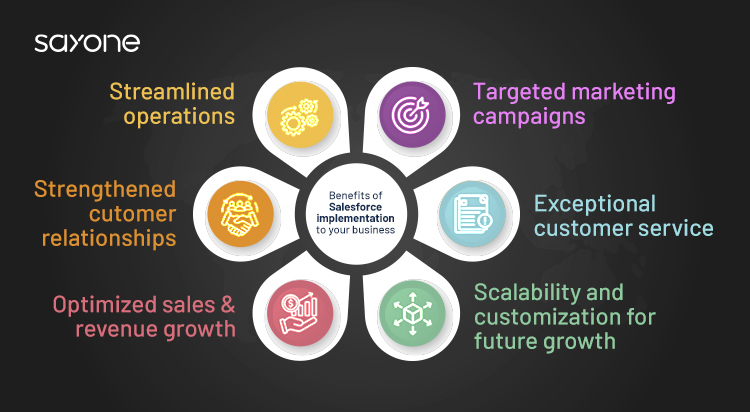
Subscribe to our Blog
We're committed to your privacy. SayOne uses the information you provide to us to contact you about our relevant content, products, and services. check out our privacy policy.

Akhil SundarMay 9, 202411 min read

Generating table of contents...
Salesforce CRM (Customer Relationship Management) sector offers cloud-based solutions that transform how businesses interact with their customers. Initiated in 1999, Salesforce pioneered the delivery of CRM solutions via the cloud, allowing access through web browsers akin to platforms like Netflix or Spotify. This method enables businesses to manage extensive customer data easily, providing a comprehensive view of customer interactions across various departments, including sales, service, and marketing.
CRM systems like Salesforce are crucial as they consolidate important information about customers and potential clients in one location. This centralized data repository is instrumental in managing sales, marketing campaigns, and customer services more effectively. Salesforce is particularly noted for its extensive market share, which stands at about 19.8%, underscoring its adoption and popularity across various industries.
By adopting Salesforce, companies can utilize these advantages to improve their operational capabilities and customer relationships, thereby driving growth and maintaining competitiveness in the market.
When preparing for a Salesforce implementation, starting with clear planning and aligning it with your business goals is crucial. Here's how you can set yourself up for success:
By methodically addressing these steps, you can ensure a well-prepared introduction to Salesforce, reduce potential risks, and fully utilize the benefits of your new CRM system. Each step not only supports the technical deployment but also aids in integrating the system into your organization's daily routines.

When implementing Salesforce, the approach you choose should align with your organization's unique needs and structure. Here's a breakdown of the key methods:

Implementing Salesforce CRM offers multiple advantages that can substantially improve various business operations. Here are some key benefits:
Salesforce offers a unified platform for storing all customer interactions, which enables businesses to view all customer activities in one place. This comprehensive view helps businesses offer tailored services and improve customer satisfaction.
Salesforce improves data structure and increases security. Businesses can ensure high-quality data through initial cleansing and deduplication of records. Regular data backups and strict security measures like encryption and access controls are maintained to protect sensitive information.
The platform integrates various tools to facilitate better coordination between sales and marketing teams. This synchronization helps manage sales pipelines more effectively and increases sales productivity. Businesses can also utilize Salesforce's analytics tools to measure the effectiveness of sales and marketing strategies and make informed decisions.
Salesforce automates many routine tasks, allowing teams to focus more on strategic activities. Automation includes customer service, case management, and even internal workflows, which improves overall operational productivity.
How Retail Automation is Paving the Way for Smart Stores
Salesforce is cloud-based and offers flexibility and easy scaling, making it simpler for businesses to adjust their CRM capabilities as they expand. Its ability to integrate with a wide range of other software and platforms ensures that Salesforce can continuously meet new business demands.
Salesforce regularly updates its offerings with the latest AI and machine learning technologies. This continual development ensures that businesses can keep up with the latest CRM technology trends and maintain a competitive edge.
Implementing Salesforce in your organization can lead to significant financial commitments, which vary widely based on several factors, such as the specific Salesforce products you select, the level of customization required, the size of your organization, and the training and support you choose to implement.
Here's a breakdown of the various costs involved:
Salesforce offers multiple editions of its products, each tailored to different sizes and types of businesses and priced accordingly. The costs can range from as low as $25 per user per month for basic functionality to higher fees for more advanced editions that offer extensive customization and features.
Depending on your business needs, you may require significant customizations or integrations with other systems. These can be costly, particularly if you need to hire external consultants or developers. Hourly rates for Salesforce developers can vary from $20 to $190.
Migrating existing data into Salesforce is a critical and expensive step, especially if your data is voluminous or complex. This process often requires professional services to ensure data is accurately transferred and integrated.
Training your team to use Salesforce effectively is essential but can add to the costs. Options range from in-app guidance to full training programs conducted by Salesforce professionals. Post-launch, ongoing support, and maintenance are crucial to address any issues and update the system as needed.
There are often hidden or additional costs, such as those for additional cloud services, advanced features like AI-driven analytics, or third-party apps from Salesforce AppExchange that may be necessary depending on your business requirements.
When planning your Salesforce implementation budget, consider not only the initial costs but also the long-term investment in training, support, and upgrades to maximize Salesforce's value to your organization. Working with a Salesforce consulting partner can provide insights and help manage costs effectively by aligning your business needs with the right Salesforce solutions.
Read More on How To Hire a Solution Architect For Your Development Project?
Selecting the right Salesforce implementation partner is crucial for the success of your CRM strategy. The process involves several critical steps and considerations to ensure you partner with a company that aligns perfectly with your business needs and can help maximize the value of your Salesforce investment.
Before diving into the selection process, clearly define your business needs, goals, and the specific Salesforce features you require. This clarity will guide your search and help you communicate effectively with potential partners.
Assess potential partners' experience and technical proficiency. Look for a history of successful implementations, especially in your industry or similar sectors. Partners with relevant experience will likely better understand your unique challenges and needs. Verifying their Salesforce certifications is also crucial, as it reflects their commitment to excellence and knowledge of the platform.
Consider the partner's track record and customer satisfaction levels. You can gauge this by examining reviews on platforms like Salesforce's AppExchange and asking for customer references. Engaging with their past or current clients can provide insights into the partner's reliability, quality of work, and customer service.
The size of the partner can impact their service delivery. Larger firms might offer more extensive resources and capabilities that are suitable for big projects or global companies. Smaller partners, however, might bring a more personalized approach and agility, which could be ideal for startups or small to medium-sized businesses.
Inquire about the partner's implementation methodology and project management practices. Partners who use agile methodologies often adapt more readily to changes and can work collaboratively with your team to ensure the project meets its targets on time and within budget.
Post-implementation support is critical for long-term success. Check the partner's support and maintenance offerings to ensure they can provide the necessary assistance after the project goes live. Effective support is key to resolving potential issues quickly and helping your team adapt to the new system.
Finally, evaluate the cultural fit. The right partner should have the technical skills and share your company's values and vision. This alignment helps build a strong, collaborative relationship, which is essential for navigating the complexities of a Salesforce implementation.
Are you looking to get more out of Salesforce CRM for your business? Pick SayOne as your trusted partner for Salesforce implementation. Our team of experts is here to tailor solutions just for your business needs. We do more than just set things up; we stick around to support and improve your system to keep your business growing and staying competitive. Contact us Today!

We're committed to your privacy. SayOne uses the information you provide to us to contact you about our relevant content, products, and services. check out our privacy policy.

About Author
Subject Matter Expert

We collaborate with visionary leaders on projects that focus on quality